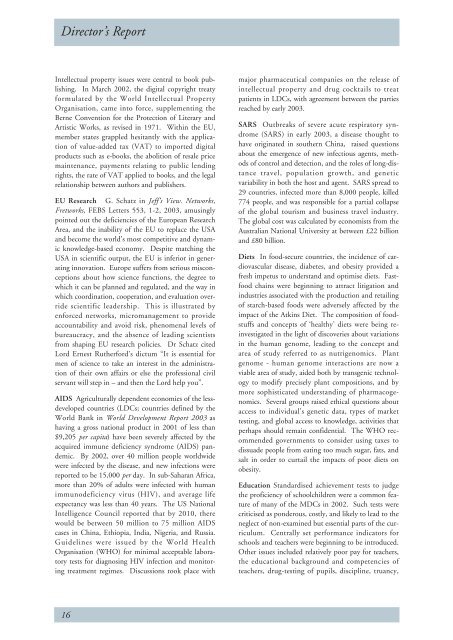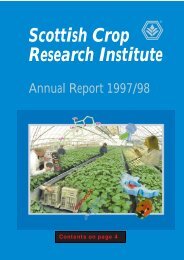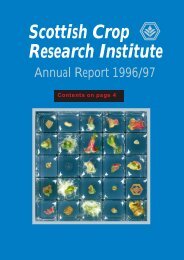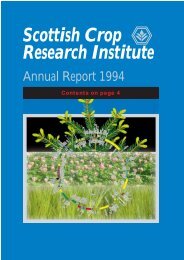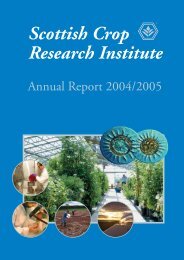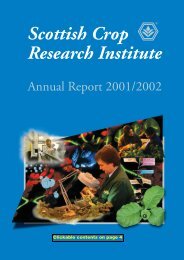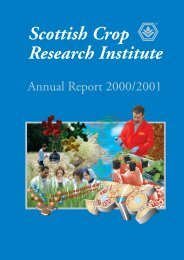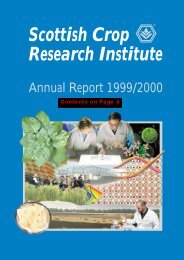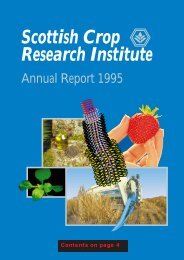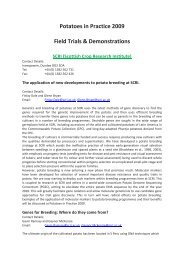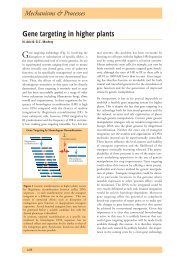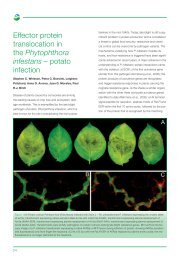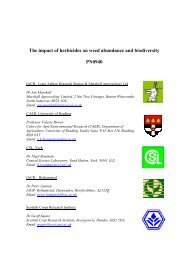PDF file: Annual Report 2002/2003 - Scottish Crop Research Institute
PDF file: Annual Report 2002/2003 - Scottish Crop Research Institute
PDF file: Annual Report 2002/2003 - Scottish Crop Research Institute
Create successful ePaper yourself
Turn your PDF publications into a flip-book with our unique Google optimized e-Paper software.
Director’s <strong>Report</strong><br />
Intellectual property issues were central to book publishing.<br />
In March <strong>2002</strong>, the digital copyright treaty<br />
formulated by the World Intellectual Property<br />
Organisation, came into force, supplementing the<br />
Berne Convention for the Protection of Literary and<br />
Artistic Works, as revised in 1971. Within the EU,<br />
member states grappled hesitantly with the application<br />
of value-added tax (VAT) to imported digital<br />
products such as e-books, the abolition of resale price<br />
maintenance, payments relating to public lending<br />
rights, the rate of VAT applied to books, and the legal<br />
relationship between authors and publishers.<br />
EU <strong>Research</strong> G. Schatz in Jeff’s View. Networks,<br />
Fretworks, FEBS Letters 553, 1-2, <strong>2003</strong>, amusingly<br />
pointed out the deficiencies of the European <strong>Research</strong><br />
Area, and the inability of the EU to replace the USA<br />
and become the world’s most competitive and dynamic<br />
knowledge-based economy. Despite matching the<br />
USA in scientific output, the EU is inferior in generating<br />
innovation. Europe suffers from serious misconceptions<br />
about how science functions, the degree to<br />
which it can be planned and regulated, and the way in<br />
which coordination, cooperation, and evaluation override<br />
scientific leadership. This is illustrated by<br />
enforced networks, micromanagement to provide<br />
accountability and avoid risk, phenomenal levels of<br />
bureaucracy, and the absence of leading scientists<br />
from shaping EU research policies. Dr Schatz cited<br />
Lord Ernest Rutherford’s dictum “It is essential for<br />
men of science to take an interest in the administration<br />
of their own affairs or else the professional civil<br />
servant will step in – and then the Lord help you”.<br />
AIDS Agriculturally dependent economies of the lessdeveloped<br />
countries (LDCs; countries defined by the<br />
World Bank in World Development <strong>Report</strong> <strong>2003</strong> as<br />
having a gross national product in 2001 of less than<br />
$9,205 per capita) have been severely affected by the<br />
acquired immune deficiency syndrome (AIDS) pandemic.<br />
By <strong>2002</strong>, over 40 million people worldwide<br />
were infected by the disease, and new infections were<br />
reported to be 15,000 per day. In sub-Saharan Africa,<br />
more than 20% of adults were infected with human<br />
immunodeficiency virus (HIV), and average life<br />
expectancy was less than 40 years. The US National<br />
Intelligence Council reported that by 2010, there<br />
would be between 50 million to 75 million AIDS<br />
cases in China, Ethiopia, India, Nigeria, and Russia.<br />
Guidelines were issued by the World Health<br />
Organisation (WHO) for minimal acceptable laboratory<br />
tests for diagnosing HIV infection and monitoring<br />
treatment regimes. Discussions took place with<br />
major pharmaceutical companies on the release of<br />
intellectual property and drug cocktails to treat<br />
patients in LDCs, with agreement between the parties<br />
reached by early <strong>2003</strong>.<br />
SARS Outbreaks of severe acute respiratory syndrome<br />
(SARS) in early <strong>2003</strong>, a disease thought to<br />
have originated in southern China, raised questions<br />
about the emergence of new infectious agents, methods<br />
of control and detection, and the roles of long-distance<br />
travel, population growth, and genetic<br />
variability in both the host and agent. SARS spread to<br />
29 countries, infected more than 8,000 people, killed<br />
774 people, and was responsible for a partial collapse<br />
of the global tourism and business travel industry.<br />
The global cost was calculated by economists from the<br />
Australian National University at between £22 billion<br />
and £80 billion.<br />
Diets In food-secure countries, the incidence of cardiovascular<br />
disease, diabetes, and obesity provided a<br />
fresh impetus to understand and optimise diets. Fastfood<br />
chains were beginning to attract litigation and<br />
industries associated with the production and retailing<br />
of starch-based foods were adversely affected by the<br />
impact of the Atkins Diet. The composition of foodstuffs<br />
and concepts of ‘healthy’ diets were being reinvestigated<br />
in the light of discoveries about variations<br />
in the human genome, leading to the concept and<br />
area of study referred to as nutrigenomics. Plant<br />
genome - human genome interactions are now a<br />
viable area of study, aided both by transgenic technology<br />
to modify precisely plant compositions, and by<br />
more sophisticated understanding of pharmacogenomics.<br />
Several groups raised ethical questions about<br />
access to individual’s genetic data, types of market<br />
testing, and global access to knowledge, activities that<br />
perhaps should remain confidential. The WHO recommended<br />
governments to consider using taxes to<br />
dissuade people from eating too much sugar, fats, and<br />
salt in order to curtail the impacts of poor diets on<br />
obesity.<br />
Education Standardised achievement tests to judge<br />
the proficiency of schoolchildren were a common feature<br />
of many of the MDCs in <strong>2002</strong>. Such tests were<br />
criticised as ponderous, costly, and likely to lead to the<br />
neglect of non-examined but essential parts of the curriculum.<br />
Centrally set performance indicators for<br />
schools and teachers were beginning to be introduced.<br />
Other issues included relatively poor pay for teachers,<br />
the educational background and competencies of<br />
teachers, drug-testing of pupils, discipline, truancy,<br />
16


